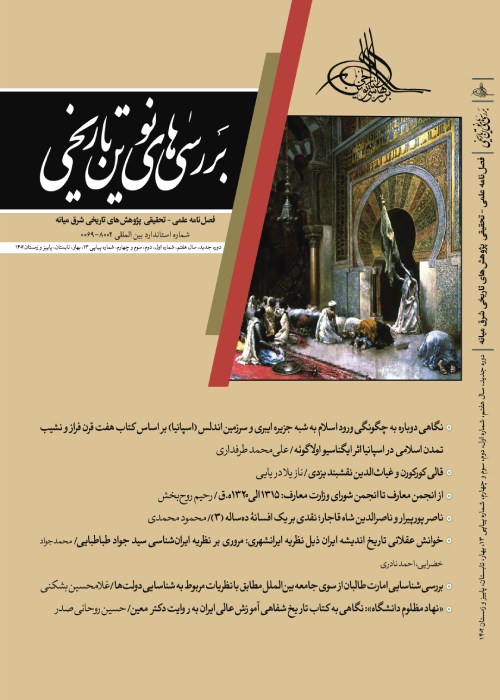History inferior to poetry; or the highest form of literature? A critique of
Author(s):
Abstract:
Should the purpose of history be education and refinement of its readers, from ancient historian’s point of view? Was the history and historiography superior to other sciences? Was the position of historians more dignified than philosophers, poets, physicians and artists? The historians and philosophers of the ancient world such as Herodotus, Aristotle, Posidonius, Polybius, Xenophon and many others, according to social and political conditions of their period, have devoted pages oftheir works to the category of history and its position in life dignity. Numerous comments have been presented for this category. Aristotle (4 B.C.) considers history lower than poetry and Diodorus Siculus, the historian of Julius Caesar’s period, 250 years after Herodotus, calls history the upmost form of literature. In overwhelming opinion of contemporary researches, Diodorus is considered as the greatest compiler of historical narratives among the historians before him. Hebrings up the narratives which on their base, he can be considered as the historian of virtues against vices. In his wisely preface for his forty-fold work, in which the science of history is smartly glorified facing with other prevalent sciences and arts of his time, specially literature, philosophy and battle assaying, he explains about philosophy of historiography that has no example or rival in other ancient historians’ work. In his preface, he expresses his purpose of writing Library ofHistory and wishes to apply the best way of historiography in his work. He intends to do his best for human thorough historiography, but his brilliant preface is clearly superior to the whole work. It can be said that his idea was strongly influenced by other ideas of his time, during writing this preface. In his works, he shows perfectly that target planning is much simpler than acting. Whileexplaining about the myths and legends of nations, He often replaces his own viewpoints and opinions with the people’s beliefs, which he talked about. He wants the legends and beliefs narrated by him, to be compatible with wisdom. In some cases, he doesn’t write what he sees or maybe he doesn’t dare to write. On the other hand, Diodorus was an ethical historian and his ethical viewpoints are obviously seen in every part of his works. He even benefits ethical words instead of political ones, while analyzing historical events. In his idea, the most principalreason of defeat or destruction of a nation is rooted in nonconformity of ethical standards. In many cases, because of ethical prejudices, he changes the principle of events and advances his narrations parallel his ethical prejudices. He loves to narrate outstanding brilliant deeds and inclines to narrate heart breaking events without asking himself if they are according to historical narrations or not. While narrating the wars, the word “Unexpected” is used a lot. From his point of view,most of battles have unexpected results. So, it can be said that Diodorus is the “Historian of marvels” in the field of war narration. When he is unable to express rational reasons in war, looks up destiny and makes it as a pretext to impress his reader in order to learn from history. Political ethics of Diodorus is based on a simple principle: As divine will changes the process of affairs, the villains are punished, so the crime or villainy is not eternal. Somehow, Diodorus’s style inwriting Library of History is fluent and monotone. Literal expressions are not seen that much in this work. He, himself persists on monotony in his style of writing. Historical library of Diodorus, is an important reference for modern historians and researchers, yet precision is needed for reading this work, because Diodorus’s ethical prejudice results siding and makes us distant from the principles of events. All these factors make the modern researchers to benefit this work, warily. Despitethis, in Library of History, some events are expressed which cant be found in any other historians’ work. Our information about complicated and difficult problems will be completed by reading this book. In this article it is tried to survey Diodorus’s historical viewpoint and style of historiography beside a review to his remaining works.
Keywords:
Language:
Persian
Published:
New Historical Studies, Volume:1 Issue: 2, 2015
Pages:
1 to 11
magiran.com/p1389327
دانلود و مطالعه متن این مقاله با یکی از روشهای زیر امکان پذیر است:
اشتراک شخصی
با عضویت و پرداخت آنلاین حق اشتراک یکساله به مبلغ 1,390,000ريال میتوانید 70 عنوان مطلب دانلود کنید!
اشتراک سازمانی
به کتابخانه دانشگاه یا محل کار خود پیشنهاد کنید تا اشتراک سازمانی این پایگاه را برای دسترسی نامحدود همه کاربران به متن مطالب تهیه نمایند!
توجه!
- حق عضویت دریافتی صرف حمایت از نشریات عضو و نگهداری، تکمیل و توسعه مگیران میشود.
- پرداخت حق اشتراک و دانلود مقالات اجازه بازنشر آن در سایر رسانههای چاپی و دیجیتال را به کاربر نمیدهد.
In order to view content subscription is required
Personal subscription
Subscribe magiran.com for 70 € euros via PayPal and download 70 articles during a year.
Organization subscription
Please contact us to subscribe your university or library for unlimited access!


